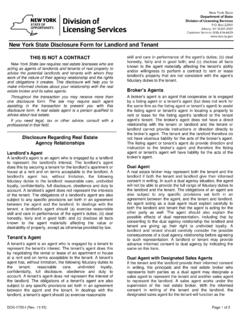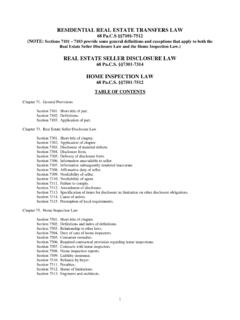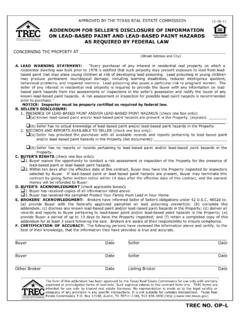Transcription of Five Deadly Sins: Lease Clauses a Landlord Should Refuse ...
1 Five Deadly Sins: Lease Clauses a Landlord Should Refuse to Negotiate under Any Circumstances August 2003. By Ira Fierstein and J. Kelly Bufton When a Landlord or its attorney prepares an initial draft of a Lease on the Landlord 's form, it is expected that the tenant will simply sign the Lease (but only if the tenant believes it has no leverage whatsoever), return the Lease with handwritten comments, or, if the tenant's comments are extensive and it has taken control of the drafting process, return a black-lined copy of the Lease that it has revised. What then begins is the long exercise of Lease negotiation, where each side asserts its best positions with the hope of ending up with a Lease with which each side can live.
2 There are, however, five provisions the Landlord and its attorney Should not agree to modify. Such modification is tantamount to the commission of a Deadly leasing sin. Here are the subject matters and sample Lease provisions that Should not be touched: 1. Hazardous Materials: Neither tenant, nor any of tenant's agents, contractors, employees, licensees or invitees shall at any time handle, use, manufacture, store or dispose of in or about the Premises or the Shopping Center any flammables, explosives, radioactive materials, hazardous wastes or materials, toxic wastes or materials, or other similar substances, petroleum products or derivatives or any substance (collectively "Hazardous Materials")
3 Subject to regulation by or under any federal, state and local laws and ordinances relating to the protection of the environment or the keeping, use or disposition of environmentally hazardous materials, substances, or wastes, presently in effect or hereafter adopted, all amendments to any of them, and all rules and regulations issued pursuant to any of such laws or ordinances (collectively "Environmental Laws"). Tenant shall protect, defend, indemnify and hold Landlord harmless from and against any and all loss, claims, liability or costs (including court costs and attorney's fees). incurred by reason of any actual or asserted failure of tenant to fully comply with all applicable Environmental Laws, or the presence, handling, use or disposition in or from the Premises of any Hazardous Materials, or by reason of any actual or asserted failure of tenant to keep, observe, or perform any provision of this paragraph.
4 The length and depth of the hazardous materials clause arises because of the complex and constantly growing body of law that now places ultimate responsibility for hazardous materials on the property owner where the material was created, used, disposed, spilled, etc. This liability has forced numerous otherwise solvent landlords into bankruptcy through no fault of their own. It is not only imperative that this clause not be altered, but also that the person responsible for the Lease determine what kind of business the tenant is engaged in and what its past record has been with regard to hazardous materials.
5 This clause will receive significant interest from any prospective purchaser or lender and Should not be altered without consulting professionals. If a tenant insists that it be permitted to handle small quantities of Hazardous Materials, the following language could be added: Notwithstanding the foregoing, and subject to Landlord 's prior consent, tenant may handle, store, use or dispose of products containing small quantities of Hazardous Materials (such as aerosol cans containing insecticides, toner for copiers, paints, paint remover and the like) to the extent customary and necessary for the use of the Premises for general office purposes.
6 Provided that tenant shall always handle, store, use, and dispose of any such Hazardous Materials in a safe and lawful manner and never allow such Hazardous Materials to contaminate the Premises, Building and appurtenant land or the environment. Even though a Lease may be a retail or industrial Lease , the use of "general office purpose" is appropriate so that the type of permitted Hazardous Materials is as limited as possible. Allowing materials customary for general industrial purposes, for example, could open the door for virtually any type or amount of hazardous materials. 2. Indemnification: Landlord shall not be liable and tenant hereby waives all claims against Landlord for any damage to any property or any injury to any person in or about the Premises or the Shopping Center by or from any cause whatsoever, except to the extent caused by or arising from the gross negligence or willful misconduct of Landlord or its agents, employees or contractors.
7 Tenant shall protect, indemnify and hold the Landlord entities harmless from and against any and all loss, claims, liability or costs (including court costs and attorney's fees) incurred by reason of (a) any damage to any property or any injury to any person occurring in, on or about the Premises or the Shopping Center to the extent that such injury or damage shall be caused by or arise from any actual or alleged act, neglect, fault, or omission by or of tenant, its agents, servants, employees, invitees, or visitors to meet any standards imposed by any duty with respect to the injury or damage; (b) the conduct or management of any work or thing whatsoever done by the tenant in or about the Premises or from transactions of the tenant concerning the Premises.
8 (c) tenant's failure to comply with any and all governmental laws, ordinances and regulations applicable to the condition or use of the Premises or its occupancy; or (d). any breach or default on the part of tenant in the performance of any covenant or agreement on the part of the tenant to be performed pursuant to this Lease . The provisions of this Article shall survive the termination of this Lease with respect to any claims or liability accruing prior to such termination. There are two key protections for the Landlord in this clause: exculpation and indemnification. First, in the exculpation, the tenant waives, or agrees not to pursue, any claims against the Landlord that arise from things that are not due to the Landlord 's negligence or willful acts.
9 The logic behind this is that the tenant's insurance Should cover these kinds of losses and, as long as the Landlord is not directly responsible for the loss, the Landlord Should not be held responsible. This is especially true for the Landlord 's repair obligations . Unless the Landlord is grossly negligent in getting the repairs made, the tenant does not have any recourse (other than to sue for breach of the Lease ) against the Landlord and the tenant's insurance Should cover his losses. The second half of this clause, the indemnification, places responsibility on the tenant for losses that arise out of the tenant's fault, work, breach of the Lease , or failure to abide by applicable governmental regulations.
10 Again, this clause in many ways is a means of determining whose insurance Should cover various incidents and Should be read in conjunction with the article regarding insurance requirements. Some tenants may object to their responsibility for "invitees or visitors," but tenants are in the best position to control the actions of such persons and therefore the tenant's insurance Should be at risk for the actions of these persons. If this is the only issue, "invitees or visitors" may be deleted. Often, a tenant will request mutual indemnification from the Landlord . This Should not be given except on a very limited basis for breach of the Landlord 's obligations to perform specific covenants under the Lease , and the tenant's sole recourse shall be to correct the situation and offset rent.

















